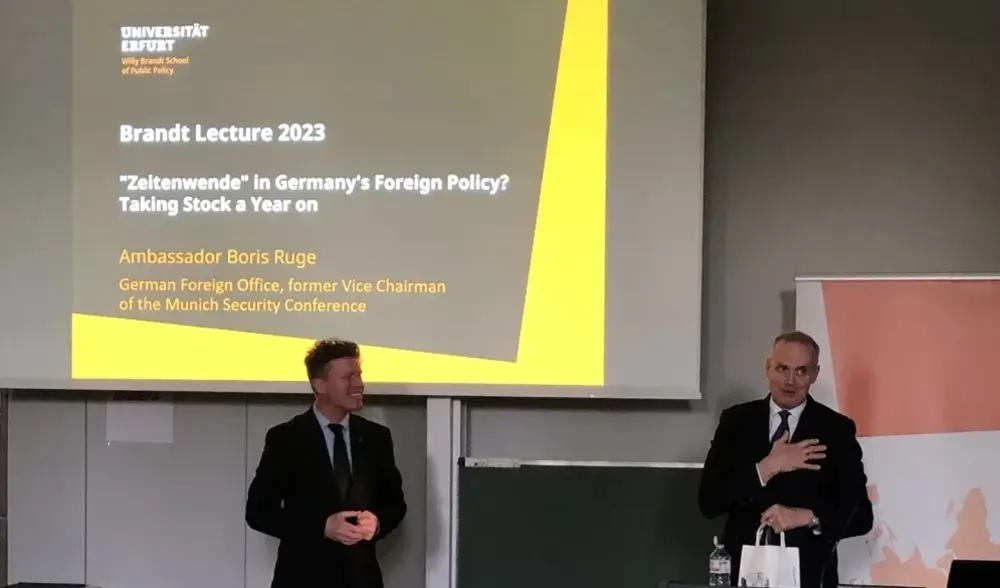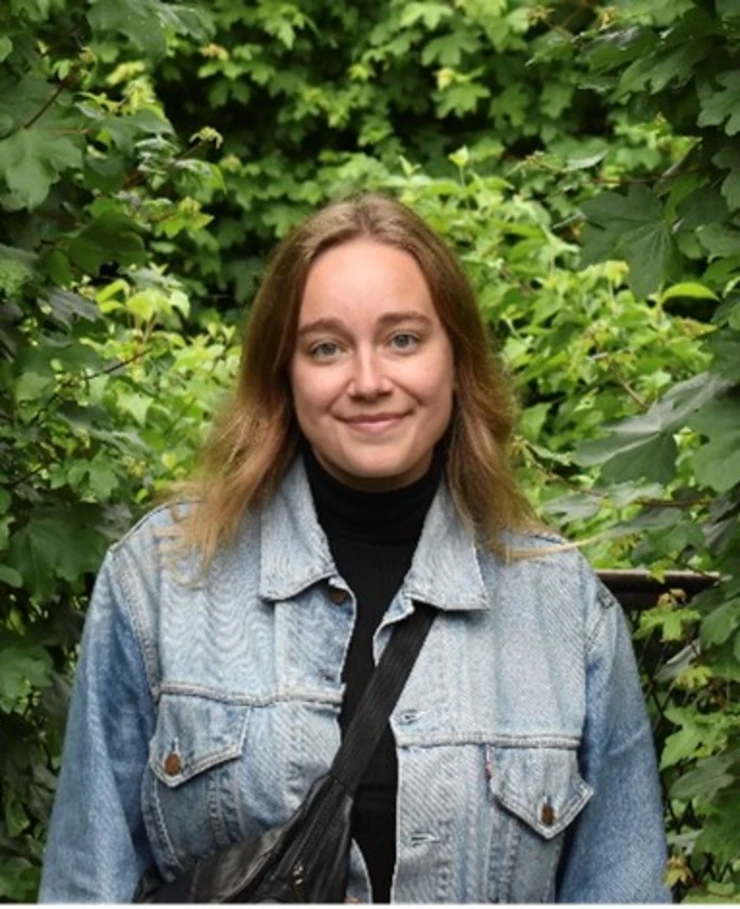Foreign Policy during a “Zeitenwende”: A conversion with Ambassador Ruge

On Tuesday, May 16, 2023, the Brandt School hosted Ambassador Boris Ruge of the German Federal Foreign Office and previously Munich Security Conference to give the annual Brandt Lecture. During his speech, Ambassador Ruge reflected on German foreign policy and the current “Zeitenwende”. “Zeitenwende” refers to a significant change or watershed moment. Foreign policy in Germany is undergoing one of these changes now, with great changes happening in Europe and worldwide. The Russian invasion of Ukraine, climate change, and technological changes are all challenges Germany will have to face and deal with through foreign policy. Following his speech, Ambassador Ruge answered some additional questions for the Bulletin Blog.
Mr. Ruge, you first started your career in the Foreign Service shortly before the fall of the Berlin wall. That for Germany you could say was a watershed moment. Are there any parallels you can draw from that time and now or any learnings?
The wall coming down is not something that happened over night, it built up over a long time. Many believed Germany would never be reunited, but there were many positive dynamics at play that led to that “unfreezing” of the European order. Now there are many more things happening at once, and it is difficult to keep up with the changes in the current world. Young people have to deal with climate change, the war in Ukraine, and technological shifts.
What are your recommendations for young people trying to keep up with these changes?
When it comes to young professionals, they are usually only in charge of one issue rather than a broad spectrum. And in my experience even junior professionals can make an impact. On a “big” issue, that will be more difficult. Sometimes working on an issue considered marginal can be more rewarding because you have more of a margin of maneuver.
We saw that Germany was slow to act on Ukraine and have also seen that the government is slow to digitalize. Why do you think the German government is often slow to change? Is this careful and unhurried mindset of Germany now unrealistic? Do you think the shift in leadership to Chancellor Scholz can alter this?
The German approach is often cautious and foreign policy has sometimes been slow to adapt. Former chancellor Adenauer had “keine Experimente” (no experiments) as an election slogan and Angela Merkel famously said “Sie kennen mich” (you know me) when she was up for another term as chancellor. If things are going well, why change them. In today’s world, moving too slow runs the risk of being left behind. While German foreign policy is changing, the world is changing faster. Leaders must have a clear vision and communication is essential. Scholz is a pretty solid conceptual thinker and has a lot of experience, so I am optimistic.
Are there some examples of other countries that are taking the Zeitenwende in their stride? What can we learn from these countries? Is China an example?
Not many in Europe would consider China as a model, but it is a huge player that can compete with the West across the board. It differs from the former Soviet Union in that it has not only a strong military but also a huge economy and a capacity for innovation. There are other countries Germany could learn from. Estonia has been doing very well with digitalization and Singapore has been very successful in human development and digitalization as well. Developing human resources will be crucial to compete in the 21st century. Sadly, social mobility is not great in Germany, which is something that needs to be addressed also because ours is an aging society.
You mentioned climate change as one of the broader issues German foreign policy will have to reckon with. What specifically do you think the role of foreign policy makers will be regarding climate change?
We need a massive course correction on climate change, and this will be painful. We also need to bring China along because everyone needs to be united on fighting climate change. Germany and the EU alone, will not be able to turn the tide. If China continues as it is, the EU may make no more than a dent in terms of slowing climate change but lose out economically in competitive sectors such as automotive. Personally, I think we need to look at all technologies that can help fight climate change, including carbon capture. Denmark has been very good at developing renewables. The challenge in Germany is in part that we are a larger country, and much more is required in terms of infrastructure, including transmission lines throughout the country. We need to convince voters and citizens that adjustments are necessary.
You mentioned in your speech about how the UN security council has a power imbalance. Do you think there needs to be a whole restructuring of the supranational institutions we know, such as the EU, UN or ICC? These bodies have no real authority so superpowers like Russia can move against the “rules”.
The power in the UN Security Council is definitely not in line with today’s realities. Since the five permanent members have veto power, changes will be very difficult to achieve. Russia, China, and the US are not party to the ICC, and it is difficult to envision the ICC garnering more support among these heavyweights. Russia is now waging a war of aggression which is illegal and undermines fundamental norms of international law and institutions.
You also mentioned that the US invasion of Iraq as a potential mistake. Why do you think this was not viewed as a major shift in the world order the way the Russian invasion of Ukraine was?
In parts of Europe, such as Germany and France, the invasion of Iraq was strongly opposed at the time. Though the invasion was also a violation of international laws, the cases of the US invasion of Iraq and Russia’s 2022 invasion of Ukraine are very different. Zelensky is obviously not the same as Saddam Hussein. Unlike Iraq, Ukraine was not in violation of UN Security Council resolutions etc. As for the outlook for Ukraine, Ukrainians are far more resistant than Russia expected. The question now is whether they can push Russia out of all occupied territories, including Crimea. The UN General Assembly supports Ukraine, and maintaining support in the court of international opinion is essential. Last year, the UN ambassador of Kenya gave a powerful speech at the Security Council calling Russia’s invasion an imperial project. But of course, in many parts of the world this is not how it is viewed.
As Ambassador you have interacted with so many diverse groups of people. You also mentioned that a lack of communication is cause for concern, in particular the US-China relationship. Can the EU intervene, or would this be detrimental for the EU’s individual relationship with those countries? What would you say is key to constructive and positive dialogue?
For conflict resolution and for diplomacy in general, empathy is essential – we need to understand where people are coming from even if we don’t agree with them. Either you need to believe that agreement is possible, or you need to learn to manage the conflict. Many times, ideological differences are too large. As for the relationship between the US and China, war between these two countries would be a catastrophe, so the key here is avoiding military conflict. Some in the EU believe it should be an intermediary. I would say that for all their differences, the EU and the US agree on fundamentals and should stand together.
Now that you have finished up at the Munich Security Conference what is next?
I will be starting a new role with NATO in Brussels on 1 September as Assistant Secretary General for Political Affairs. NATO needs to continue to help Ukraine prevail and this will be part of my job. I will also be managing relationships with NATO partners and will be working on arms control, disarmament, and non-proliferation.
We thank Mr. Ruge for his time to participate in the interview.
About the Author

Lara Schüth is a first year MPP student at the Willy Brandt School. She has a Bachelors Degree in History and Sociology from the University of Minnesota — Twin Cities and worked in the non-profit sector in the United States for several years. Her interests include youth civic participation, political education, and environmental justice.
~ The views represented in this blog post do not necessarily represent those of the Brandt School. ~